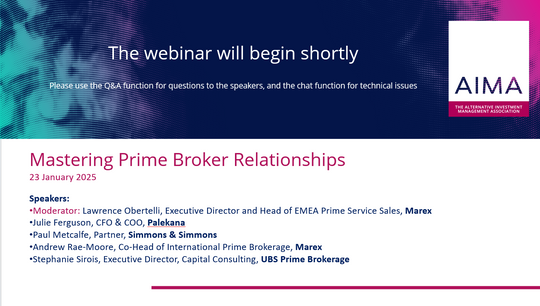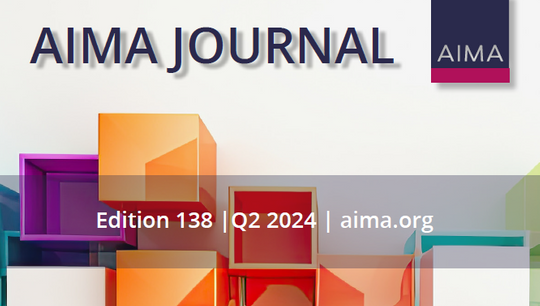Outsourced trading: Solving cost, scale and execution challenges for hedge funds
By Massimo Labella, Marex
Published: 24 March 2025
Outsourced trading is on the rise, and fund managers of all sizes across the globe are reaping the benefits of this growing trend. Outsourced trading is not simply a way to cut costs, but can be a key component in scaling operations and accessing expertise, liquidity and infrastructure that might otherwise be out of reach.
Once considered a niche service used primarily by smaller, US-based fund managers trading equities, outsourced trading is now used by firms of all sizes worldwide to bolster trading capabilities across asset classes and markets and enhance operations. This has been driven by the need for cost efficiencies, operational flexibility and access to expertise.
A Coalition Greenwich report confirms the shift in attitudes towards outsourced trading over the last few years. According to its findings in 2023, 39% of asset managers recognised the value of supplementing their internal teams with outsourced providers, up from just 5% in 2020.
In 2024, industry publications, The TRADE and Global Custodian highlighted an even more significant trend in their annual Outsourced Trading Survey, conducted amongst fund managers, asset managers, hedge funds and other buy-side firms. They noted that a number of firms are migrating to a full outsourced trading model rather than using an outsourced provider to supplement their existing offering, such as adding an asset class or extending into a different time zone. This shift from a hybrid (or co-sourced) model to full outsourcing is important. It reveals that once clients try outsourced trading, they see the benefits and often want more – it validates the model.
Regardless of whether a fully outsourced or a hybrid partnership is required, it is important that fund managers understand the totality of the offering available from their selected outsourced trading partner. They may choose to opt for one or two services from the outset, but their requirements may change as their business evolves.
Based on experience in supporting new launches through to multi-billion-dollar funds with a high-touch, complete and hybrid outsourced trading solution, the top five reasons why clients opt for outsourced trading are as follows:
- Diversification to new asset classes
Launching and managing a new asset class in-house requires specialised expertise, along with substantial investments in infrastructure, technology and additional personnel. An outsourced trading partner can simplify and speed up this process by providing instant access to experienced traders who are skilled in a wide range of asset classes, the required infrastructure and post-trade set-up.
Leveraging the relationships that outsourced trading providers have with top-tier banks and non-banks, they can also offer access to deep liquidity pools and competitive spreads across a multitude of asset classes. Additionally, they can handle oversight, monitoring and reporting for new asset classes, ensuring compliance with regulatory requirements.
- Access to new territories
Outsourced trading gives access to new geographic territories, offering fund managers a seamless way to expand their market reach in both emerging markets and developed regions without the complexities of having to establish a local presence like larger outsourced trading firms have. Managers gain access to experienced professionals who are familiar with regional market dynamics, local regulations and trading nuances. This enables them to access new markets quickly, while mitigating the risks and costs associated with navigating unfamiliar territories.
Additionally, outsourced trading provides the flexibility to test a new market (or asset class, as highlighted above) before making a long-term commitment. If they wish to, managers can later transition to an in-house team as they build upon their initial market insights and experience.
- Reinforcing day-to-day execution bandwidth
Whether a fund manager requires holiday cover, temporary cover or permanent additions to their trading or support team, outsourced trading partners can flex to meet specific requirements, as and when needed. They can provide cover for a particular time zone, 24-hour cover or just for periods of high volatility – whatever is required. It is this level of flexibility which makes outsourced trading such an attractive proposition. As the manager’s needs evolve, they can lean on their provider to quickly scale up to meet increased demand.
- Access to expertise and resources that aren’t available in-house
Different outsourced trading providers offer different models and capabilities. One of the most significant advantages of outsourcing is the ability to leverage buy side expertise, backed by experienced support staff and sophisticated trading and reporting infrastructure, without the financial and operational burden of investing in these capabilities in-house.
Services include trade execution, pre- and post-trade activities, settlement, portfolio reconciliation, reporting, trade cost analysis, commission management and access to valuable research. Capital introduction is part of the package for some outsourced trading providers.
Outsourced providers’ networks and broad reach give them access to deeper liquidity pools, improving trade execution and overall performance. Additionally, with experience across multiple clients and sectors, they can also implement operational workflows that can be more advanced than most individual funds are able to build internally.
- Cost efficiencies
The reduced operational costs from savings on technology, salaries and other administrative expenses are evident. A further benefit is that outsourcing shifts fixed costs to variable ones, providing greater flexibility for funds to manage financial pressures, and freeing up the balance sheet for other key investments.
The importance of cost-effective, streamlined operations is underscored by the Standing Strong: Emerging Manager Survey 2024 by AIMA and Marex, which highlights how investors increasingly value lean and efficient operating models when evaluating fund managers. Outsourcing functions such as trading shows investors that resources are being used strategically and efficiently in order to drive results.
By leveraging one or many of the use cases highlighted above, fund managers can focus on their investment strategy and alpha generation.
Keeping control
It’s worth noting that one of the biggest concerns about outsourcing trading often raised by management is that it could result in a loss of control or won’t deliver the performance needed. This couldn’t be further from reality. We have seen fund managers benefit from full transparency during the entire trade lifecycle, from the time the portfolio manager sends an order to the time the trade is executed – and having an experienced team of buy-side traders can result in deeper expertise and more refined processes. Far from a loss of control, outsourcing can provide access to a level of best practice and operational excellence that can be difficult to achieve with in-house resources.
Selecting the right provider
As outsourcing continues to gain momentum and new players enter the market, the importance of selecting the right provider remains key. Proper due diligence on the breadth and depth of services on offer is critical.
Key questions to ask include: How much operational support will there be? What is the pricing model? What level of transparency, trade aggregation and reconciliation is provided by the outsourced trading solution? How many traders do they have, and what level of buy-side experience do they possess? What is the breadth of the broker network and asset class coverage?
Asking the right questions from the outset and getting the relationship right can go a long way to securing a mutually beneficial arrangement. A well-chosen provider becomes a true partner, fully integrating with your team and reflecting your values. They will be a valuable ally, strengthening operations and adding value, without sacrificing control or quality.
Think about the solutions that you need as opposed to the solutions being offered. This will ensure that the outsourced provider tailors the solution to fit your specific needs, aligned with your goals.







